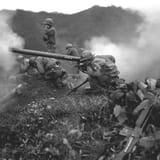>>64401645
>sixth stage
the lack of advances appears to weigh on chinese troop morale at this point, with casualties beginning to become disparate between the two sides more sharply, rather than the relatively close parity of the maneuver warfare earlier. the majority of the war is then fought in this stage, with china taking increasingly lopsided casualties, but almost always maintaining a 3:2 troop advantage. the US would make only slow advances at this point, as even if the enemy's equipment was worse, china was fielding a lot more of it. the USSR was also pouring equipment into china's military at rates starting to resemble lend-lease, while using the skies to test their own new aviation equipment.
political support ended up being difficult to rally on either side at this point, and the war started to stall, with south korea signaling that it wished to sue for peace, being the majority of the coalition casualties and troops. this war is actually seen as a probable cause for Eisenhower's eventual electoral victory, with Truman having lost some popularity with his party for the perceived stalemate and flagging support for the war back home. china, facing some local army units even occasionally breaking and turning on their commanders due to worsening conditions in the war, especially seeing that they had functionally achieved at least the objective of returning the front to what was nominally close to the original border, signaled their willingness to entreat a negotiated peace, with rumors saying this went over the head of north korean leadership at first even. the USSR had some desire to see the war continue to keep consuming american materiel(most of which was being lost as aid to south korea), and the US had some generals in the pentagon with the same desires, but peace had become a campaign issue for Eisenhower's victory, and every side could claim at least some measure of victory by settling the war in 1953.
